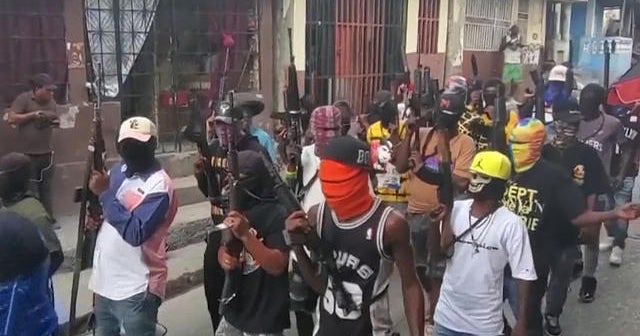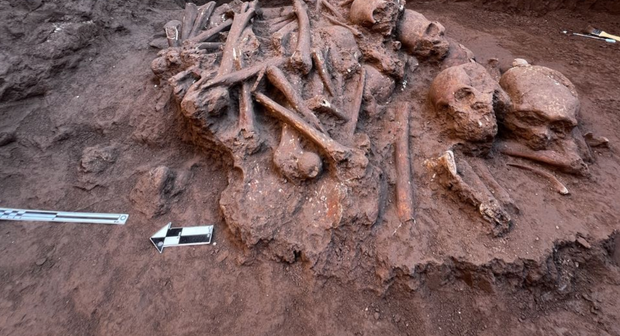CBS News
Trove of ancient skulls and bones found stacked on top of each other during construction project in Mexico

Archaeologists working on a site in Mexico found ancient skulls and bones stacked on top of each other, offering a glimpse into the practices of how some funerals might have been carried out in the region and era, officials said.
The discovery was made in Pozo de Ibarra, a small town in the state of Jalisco. Personnel from the National Institute of Anthropology and History, a government department, were observing the construction of a sanitary sewage network, to protect any cultural artifacts that might be found during the project, the INAH said in a news release.
As the work went on, the archaeologists discovered a funerary system, where a series of bones were carefully arranged. Long bones, like tibias and femurs, were placed in one part of the system, while skulls were in another area. Some skulls were even stacked on top of each other.
Claudia Servín Rosas, INAH
In total, researchers found at least seven complete skulls, the INAH said, each likely belonging to a male individual. Those individuals were all of different ages, and some of the skulls show cranial modification, a social practice where the skull was shaped a certain way for aesthetic purposes, the institute said.
The archaeologists were able to determine that the bones were placed in these patterns after they had become skeletonized, suggesting a “complex funerary system,” according to the INAH. All of the bones were buried at the same time.
It’s not clear why the burial would have been conducted this way, the INAH said, noting that that there are no precedents for this type of funeral. The department suggested that the seven men might have been from one family and that the remains were buried there as part of a rite to found a settlement.
The practice may date back to the Amapa cultural era, which occurred from 500 AD to 800 or 850 AD. Ceramic vessels and figurines found at the site have helped researchers determine the time frame when it may have been built.
The remains will be protected and preserved for further research, the INAH said.
CBS News
Eye Opener: At least 70 people killed in gang attack in Haiti, United Nations says

Watch CBS News
Be the first to know
Get browser notifications for breaking news, live events, and exclusive reporting.
CBS News
Floods, landslides struck parts of Bosnia as residents slept, leaving at least 16 dead and several missing

A severe rainstorm struck Bosnia overnight Friday, killing at least 16 people in floods and landslides in several towns and villages in central and southern parts of the country, with surging waters rushing into people’s homes as they were sleeping.
Rescue services in the south said several people were missing and called on volunteers and the army to assist as roads were closed and houses left without electricity.
Josip Kalem, a resident of Fojnica, one of the towns hit by the floods, said his dog’s barking woke him up at around 4 a.m. When he came out on the terrace, he saw the water rising rapidly.
“I came down, woke up my wife, and we looked around, we could not get out of the house. We saw more and more water coming in,” he said. “All of a sudden, the water was flooding the garage, basement, my car — everything. The water swept it all away, including my dog. Flood took it downstream.”
Andja Milesic, another resident of Fojnica, also said she was caught by surprise in the middle of the night.
“When I woke up, my bedroom floor was already soaked. I walked into the hallway — water was everywhere — the living room, everywhere,” she said. “It was horrible.”
Armin Durgut / AP
Darko Juka, a spokesman for the local administration, said at least 14 people had died in and around the southern town of Jablanica. Officials later said two more bodies have been found.
“Those are the ones who have been discovered by rescuers,” he said. “We still don’t know the final death toll.”
“I don’t remember such a crisis since the war,” Juka said referring to the 1992-95 war in Bosnia that left the country in ruins. “The scale of this chaotic situation is harrowing.”
Defense Minister Zukan Helez told N1 regional television that troops have been engaged to help and that the casualties were reported.
Helez said that “hour after hour we are receiving news about new victims. … Our first priority is to save the people who are alive and buried in houses where the landslides are.”
A pregnant woman lost her baby after she was rescued from the floods and transferred to a hospital in the regional center of Mostar. Authorities said doctors were fighting for her life as well. Separately, a child was successfully rescued and hospitalized, local officials said.
Rescue services in the towns of Jablanica and Kiseljak said the power was off overnight and mobile phones lost their signal.
The Jablanica fire station said that the town was completely inaccessible because roads and trainlines were closed.
“The police informed us that the railroad is also blocked,” the state rescue service said in a statement. “You can’t get in or out of Jablanica at the moment. Landline phones are working, but mobile phones have no signal.”
It urged people not to venture out on the flooded streets.
Human-caused climate change increases the intensity of rainfall because warm air holds more moisture. This summer, the Balkans were also hit by long-lasting record temperatures, causing a drought. Scientists said the dried-out land has hampered the absorption of floodwaters.
Armin Durgut / AP
Drone footage broadcast on Bosnian media showed villages and towns completely submerged under water, while videos on social networks showed dramatic scenes of muddy torrents and damaged roads.
One of the busiest roads linking Sarajevo with the Adriatic coast via Jablanica was swept into a river, together with a railway line in a huge landslide, according to photos.
“Many people are endangered because of big waters and landslides. There is information about victims and many injured and missing persons,” said the civic protection service.
Authorities urged people to stay on the upper floors of their homes. Reports said surging waters swept away domestic animals and cars as the water swiftly filled up lower floors of buildings.
The heavy rains and strong winds were also reported in neighboring Croatia, where several roads were closed and the capital of Zagreb prepared for the swollen Sava River to burst its banks.
Heavy winds have hampered traffic along the southern coast of the Adriatic Sea, and flash floods caused by heavy rain threatened several towns and villages in Croatia.
Floods caused by torrential rains were also reported in Montenegro, south of Bosnia, where some villages were cut off and roads and homes flooded.
In 2014, floodwaters triggered more than 3,000 landslides across the Balkans, laying waste to entire towns and villages and disturbing land mines leftover from the region’s 1990s war, along with warning signs that marked the unexploded weapons.
CBS News
The Uplift: Steve Gleason and more

Watch CBS News
Be the first to know
Get browser notifications for breaking news, live events, and exclusive reporting.












